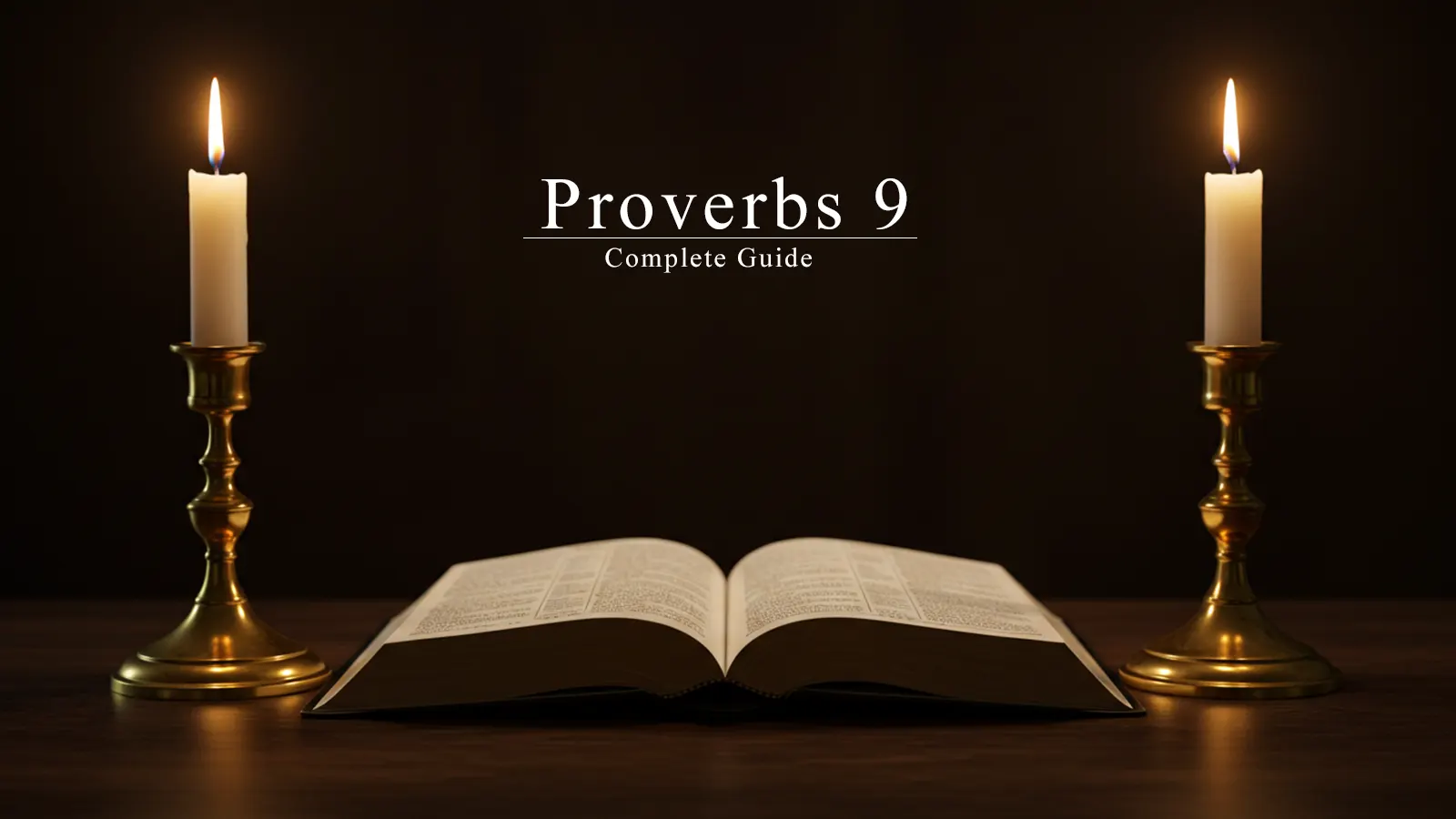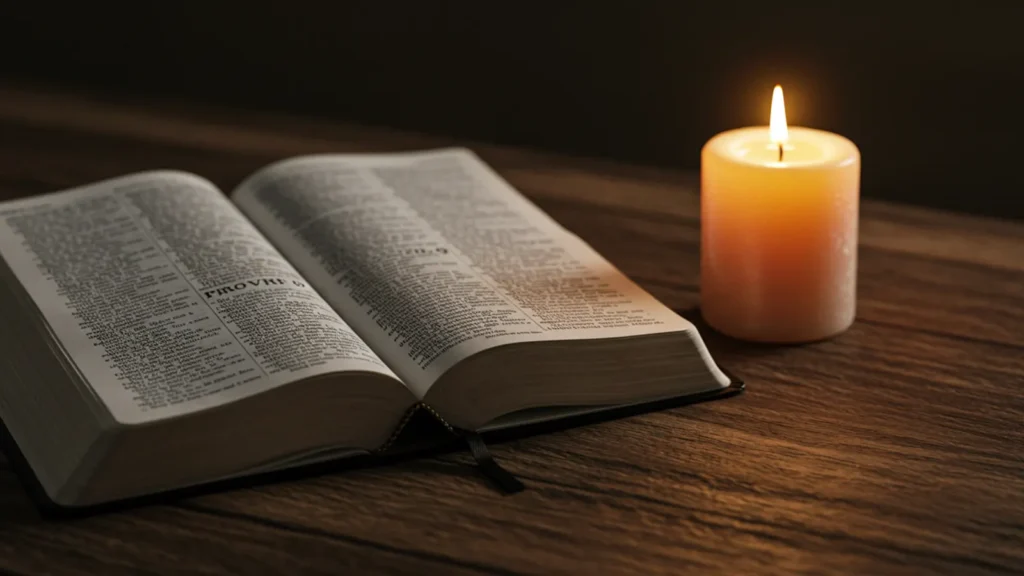Proverbs 9 opens a clear window between two invitations: that of wisdom and that of folly. To make your reading easier, this study combines short paragraphs, objective lists, and comparison tables. This way, you quickly find what you need—structure, symbols, applications, questions, and a study plan.
Table of Contents
Quick Summary of Proverbs 9
Proverbs 9 presents a fundamental choice between two paths: the path of wisdom and the path of folly.
- Wisdom is described as a woman who builds a sturdy house with seven pillars, prepares a banquet of bread and wine, and invites the simple to grow in prudence and discernment.
- A wise life shows itself in the “fear of the Lord,” which is the beginning of all understanding, and in the willingness to welcome correction.
- In contrast, folly, represented by the foolish woman, makes a noisy call, offering easy pleasures like “stolen waters” that seem sweet but hide serious consequences.
- The chapter teaches that every decision involves listening to one of these voices. One leads to solid growth; the other, to disguised destruction.
👉 In short, Proverbs 9 is an invitation to choose the right table: that of wisdom, which nourishes and sustains life, instead of folly, which seduces but deceives.
Proverbs 9: chapter map (in 3 blocks)
1) The Invitation of Wisdom
- House with “seven pillars” (solidity and completeness).
- Banquet: bread and wine (nourishment and joy).
- Public call to the simple (people open to learn).
2) The Heart that Accepts Correction
- Reproof improves the wise.
- The scoffer rejects it and closes himself off.
- The “fear of the Lord” aligns the mind and choices.
3) The Echo of Folly
- The foolish woman promises shortcuts.
- “Stolen waters seem sweet,” but hide consequences.
- The end is hidden: those who enter do not realize they are walking into the shadows.

Proverbs 9: comparison table (Wisdom × Folly)
| Aspect | Wisdom | Folly |
|---|---|---|
| Place | House with seven pillars (stability) | Noisy doorway (exposure without depth) |
| Invitation | Public, generous, formative | Noisy, seductive, rushed |
| Symbol | Banquet (bread and wine) | “Stolen waters” (illusion of advantage) |
| Target audience | Simple who want to learn | Unaware who seek shortcuts |
| Response to correction | Grateful and grows | Mocks and hardens |
| Outcome | Prudence and discernment | Emptiness and hidden consequences |
Proverbs 9 and its symbols (short explanation)
- Seven pillars: image of a complete house; a base for every area.
- Banquet: learning is to nourish and celebrate; applied knowledge becomes joy.
- Heights of the city / streets: the decision happens in everyday life.
- Stolen waters: the allure of the forbidden that charges a high price later.

Proverbs 9: Commentary
Proverbs 9:1
“Wisdom has built her house; she has hewn out her seven pillars.”
Here wisdom is personified as a woman who builds a solid house. The seven pillars symbolize perfection, stability, and completeness. The image shows that a life based on wisdom is firm, well structured, and prepared to stand the test of time.
Proverbs 9:2
“She has slaughtered her animals; she has mixed her wine; she has also set her table.”
The banquet is prepared with food and wine. The message is that wisdom not only invites but offers sustenance and joy. Following wisdom is to sit at a plentiful table, ready to nourish and strengthen.
Proverbs 9:3
“She has sent out her maidens; she cries out from the highest places of the city,”
Wisdom sends messengers to call everyone. This shows that the invitation is public and accessible. Wisdom does not hide; it presents itself clearly to all who desire to learn.
Proverbs 9:4
“Whoever is simple, let him turn in here! As for him who lacks understanding, she says to him:”
The word “simple” is not pejorative, but refers to those who are inexperienced and open to learning. Wisdom invites them to leave naivety and walk a path of growth.
Proverbs 9:5
“Come, eat of my bread and drink of the wine I have mixed.”
Wisdom offers spiritual food: bread as sustenance and wine as joy and celebration. Learning from wisdom is a banquet that strengthens body, mind, and spirit.
Proverbs 9:6
“Forsake foolishness and live, and walk in the way of understanding.”
Here is the promise: abandoning folly brings true life. The way of understanding is the path that leads to sound decisions and a more conscious life.
Proverbs 9:7
“He who corrects a scoffer gets shame for himself, and he who rebukes a wicked man only harms himself.”
The scoffer is one who mocks and rejects any counsel. Correcting him usually generates conflict and contempt. It’s a warning: not everyone is willing to hear the truth.
Proverbs 9:8
“Do not correct a scoffer, lest he hate you; rebuke a wise man, and he will love you.”
The contrast is clear: the fool hates correction; the wise value it. Those who love wisdom see rebuke as an opportunity for growth.
Proverbs 9:9
“Give instruction to a wise man, and he will be still wiser; teach a just man, and he will increase in learning.”
The wise never stop learning. Receiving instruction makes them even more prepared. A wise life is marked by continual growth.
Proverbs 9:10
“The fear of the Lord is the beginning of wisdom, and the knowledge of the Holy One is understanding.”
This is the heart of the chapter. The foundation of wisdom is the fear of the Lord, understood as reverence and respect for God. The “knowledge of the Holy One” brings prudence—discernment to live rightly.
Proverbs 9:11
“For by me your days will be multiplied, and years of life will be added to you.”
Wisdom promises to prolong and enrich life. It’s not only about quantity of years, but the quality of existence.
Proverbs 9:12
“If you are wise, you are wise for yourself; and if you scoff, you will bear it alone.”
Choices have direct impact: those who pursue wisdom reap benefits; those who choose to mock bear the consequences alone.
Proverbs 9:13
“A foolish woman is clamorous; she is simple and knows nothing.”
Now the counterpart appears: folly is also personified as a woman. Noisy, empty, and lacking knowledge, she symbolizes rash and superficial choices.
Proverbs 9:14
“For she sits at the door of her house, on a seat by the highest places of the city,”
The foolish woman also takes a prominent position, drawing everyone’s attention. She does not make an effort; she only waits and shouts.
Proverbs 9:15
“To call to those who pass by, who go straight on their way:”
Her invitation is directed at those who walk the right path. She tries to divert those who are firm, offering shortcuts.
Proverbs 9:16
“Whoever is simple, let him turn in here; and as for him who lacks understanding, she says to him:”
Just like wisdom, folly also invites the simple. But her call produces no growth—only deception.
Proverbs 9:17
“Stolen water is sweet, and bread eaten in secret is pleasant.”
Folly promises pleasure in the forbidden. The temptation presents itself as sweet, but it is fleeting and destructive. It is the seduction of the shortcut.
Proverbs 9:18
“But he does not know that the dead are there, that her guests are in the depths of Sheol.”
The end of folly is revealed: death and perdition. The invitation seemed pleasant, but it leads to emptiness and destruction. It is the definitive contrast with the life promised by wisdom.
How to apply Proverbs 9 today (practical checklists)
Before deciding
- Does this strengthen my “pillars” (character, word, relationships, work, time, choices, hope)?
- Am I reacting with discernment or with haste?
- What hidden cost might exist?
In a weekly learning routine
- Set aside 2 short blocks for reading and notes.
- Talk with someone mature (ask for feedback).
- Record 1 correction you welcomed and 1 adjusted attitude.
To filter noise
- Delay impulsive responses.
- Check the source (who is inviting? what’s the track record?).
- Prioritize what is consistent, not merely attractive.

“Seven pillars” as life criteria (applicable list)
- Character: integrity when no one is watching.
- Word: speak at the right time and with truth.
- Relationships: surround yourself with people who build you up.
- Work: prioritize the essential, not only the urgent.
- Time: rhythm rest, study, and service.
- Choices: think long term.
- Hope: sustain vision when results take time.
Mini devotional reading guide for Proverbs 9 (7 days)
- Day 1: read wisdom’s invitation and choose 1 pillar to strengthen.
- Day 2: map 3 noises that hinder discernment.
- Day 3: welcome 1 difficult correction and note the gain.
- Day 4: set your “banquet” (readings + conversation + silence).
- Day 5: review a recent decision through the lens of prudence.
- Day 6: identify a “shortcut” and calculate the hidden cost.
- Day 7: re-read Proverbs 9 and summarize the week’s lesson in 2 sentences.
Questions for personal or group reflection (quick)
- Which “invitations” most occupy your listening day to day?
- In which areas do you reject correction? Why?
- Where does the fear of the Lord need to be more visible in your schedule?
- What “stolen water” once seemed sweet to you? What did you learn?
Quick glossary (to read without stumbling)
| Term | Essential meaning |
|---|---|
| wisdom | Applying what is right, in the right way and time |
| folly | Acting without considering consequences |
| fear of the Lord | Reverence that organizes choices and priorities |
| prudence | Intelligent caution that avoids excess and impulse |
| discernment | Distinguishing appearance from essence |
| simple | An open learner; can grow or go astray |
| foolish woman | Personification of seductive folly |
Connections between Proverbs 9 and the rest of the book (to guide your studies)
- Prologue (1–9): shapes conscience; Proverbs 9 closes the cycle of the “two voices.”
- Collections of sayings (10–29): show the daily practice of wisdom.
- Final (30–31): portraits of mature and competent life (practical close to the ideal presented at the beginning).
Study boards: “Two invitations, two harvests”
| Step | Wisdom (long and safe path) | Folly (shortcut and hidden cost) |
|---|---|---|
| 1. Voice | Calm, well-founded | Noisy, rushed |
| 2. Offer | Formation (banquet) | Quick pleasure (stolen waters) |
| 3. Response | Accepts correction | Rejects correction |
| 4. Fruit | Prudence and discernment | Guilt, confusion, stagnation |
Proverbs 9 for everyday life (short examples)
- Communication: answer after listening; choose words that build up.
- Projects: plan, do, review; celebrate small wins (banquet).
- Relationships: seek those who correct with love; flee noisy flattery.
- Finances/time: say “no” to shortcuts; “yes” to the process that builds a foundation.
Group session outline (30–45 min)
- Read Proverbs 9 aloud.
- On paper: list the “invitations” we heard this week.
- Each person chooses 1 pillar to practice for 7 days.
- Closing: short prayer asking for prudence and discernment.
Frequently Asked Questions (FAQ)
What does Proverbs 9 mean?
Proverbs 9 presents a contrast between two paths: that of wisdom and that of folly. Wisdom is described as a hostess who prepares a solid house and a banquet for those who wish to learn. Folly is portrayed as a foolish woman who lures with easy promises but leads to ruin. The chapter teaches that every person is called to choose which voice to follow.
What is the meaning of Proverbs 9?
The central meaning of Proverbs 9 lies in the decision to listen either to wisdom or to folly. Wisdom leads to life, steadiness, and growth; folly leads to emptiness and destruction. In short, the chapter shows that living with discernment depends on reverence for God and a willingness to receive correction.
What do the seven pillars in Proverbs 9 signify?
The seven pillars represent solidity, stability, and completeness. In biblical culture, the number seven is linked to perfection. Applied to the text, it indicates that wisdom’s house is firm in every area: character, word, relationships, work, time, choices, and hope. Each pillar symbolizes an essential foundation for a balanced life.
What does Proverbs 9:10 teach us?
The verse “The fear of the Lord is the beginning of wisdom, and the knowledge of the Holy One is understanding.” teaches that true wisdom begins with reverence for God. It is not about terror, but deep respect that guides decisions. Furthermore, the “knowledge of the Holy One” highlights that prudence and discernment come from an intimate relationship with God, not merely from human effort.
Conclusion
As we walk through Proverbs 9, we see two invitations, two tables, and two ends. Wisdom builds from the inside, invites to a process, and nourishes with solid content and quiet joy.
Folly offers glittering shortcuts and withered outcomes. The excellent way is born from the fear of the Lord, blossoms in prudence, and is confirmed in discernment. Choosing the right table, day after day, is to build the house with seven pillars.
READ ALSO:
- Ainda Que Eu Falasse a Língua dos Anjos: 1 Coríntios 13
- Apocalipse 2: Significado, Mensagem e Reflexões para Hoje
- Saiba o Significado do Nome Matheus: Origem e Curiosidades
FOLLOW US ON FACEBOOK